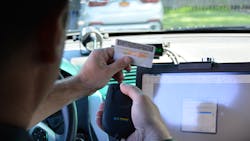Author: Christopher Tarantino, Public Safety Communications Consultant, L-Tron Corporation
Whether on patrol or in the lab, we all have a routine similar to this one. While each of our routines may vary slightly (get kids ready for school, read paper, watch news, etc.), there are commonalities, themes, and outcomes that we expect to see (e.g.: leave house by 5:30).
Have you ever noticed what happens when you deviate from that routine – even slightly? Disaster! You leave your house later than expected, rush to work, and your entire day is off.
This is easy to visualize in our personal lives, but building and maintaining a process-oriented culture in the workplace is a little more difficult.
What can happen if one deviates from procedure during a traffic stop? What happens if there is a missed 360 check or a distraction that impacts your awareness? (Hint: it can be much worse than running late for your shift.)
The Importance of Muscle Memory
At L-Tron Corporation, everything we do is process-oriented, with the expectation of 0% error in all operations.
We achieve this goal through muscle memory. Our policies and processes are laid out in procedural documentation, training and reviews are coordinated regularly, and we cross-train personnel to be equipped to handle whatever gets thrown their way.
To quote L-Tron’s Operations Lead, Sally, “Being average isn’t good enough; we take special care to work collaboratively and minimize the potential for error, while providing the best customer service possible. We strive to meet our commitment of 100% quality at every opportunity.” You can learn more about our culture and tight-knit processes in our L-Tron Difference Case Study.
Using Muscle Memory
Muscle memory has a slightly different meaning and context in the life of a police officer or public safety professional.
When reviewing the basics of firearms training, recruits/cadets practice their skills and work toward proficiency for hours and days on end. The goal of this reinforcement is not only to train until you get it right, but (as the saying goes) train until you can’t get it wrong.
Created in a controlled environment, procedural muscle memory trains your brain to quickly instruct your body how to complete a task (almost without having to think about it). Quantity of reinforcement isn’t the only factor here though; muscle memory works in both positive and negative contexts (i.e. if you keep practicing the wrong thing, you’ll be highly proficient at the wrong thing) and can quickly be derailed through distraction and stress.
Minimizing deviations from our processes will enhance our muscle memory. Furthermore, ensuring technology enhances our operations instead of detracting will keep officers safe and focused on what is most important.
Muscle memory tip: When scanning a driver’s license during the electronic ticketing (eCitation) process, train yourself to scan the driver’s license above the driving wheel. In doing so, you are more aware of your surroundings, increasing officer safety.
Read “How eCitation Increases Officer Awareness” for other awareness-related tips.
So just like L-Tron aims for 0% error, you should aim for 0% distraction. That way you can ensure you’ll make it home safely and engage in another routine: go home, spend time with your family, and wake up the next day to do it all over again.
About L-Tron Corporation
L-Tron is a leading solutions provider focused on automating and improving data collection practices for our clients. We have been working with the Law Enforcement Community for more than 15 years. We implement rugged computing and peripheral solutions designed specifically for Law Enforcement to improve accuracy and efficiency for mobile enforcement tasks such as electronic citation (eCitation), motorist warning, motor vehicle accident and other incident reporting. See more…
About the Author
Christopher Tarantino MEP CMCP partners with L-Tron and has ten years’ experience in public safety. He currently holds positions at the volunteer, local, county, state and federal levels. Mr. Tarantino serves as a Subject Matter Expert/Instructor for the National Disaster Preparedness Training Center; a Digital Communications Specialist for FEMA; is the Vice-Chair of the International Association of Emergency Managers' Emerging Technology Caucus; is part of the Command Staff in the New York State Incident Management Team (Public Information Officer-T); and maintains volunteer roles at the local/county level as a Red Cross DAT and DPAT member, Firefighter/EMT, Hazardous Materials Technician and Rescue Specialist.



